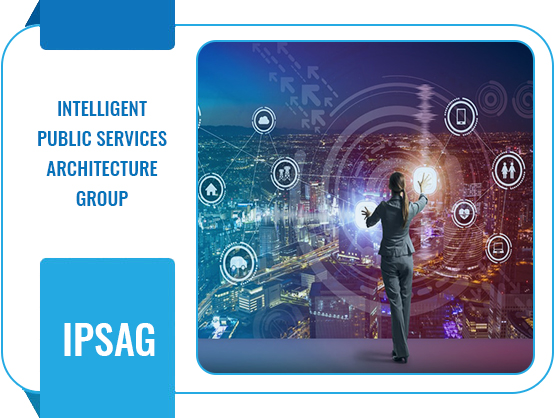
Intelligent Public Services Architecture Group (IPSAG)
The Intelligent Public Services Architecture Group (IPSAG) is a research-oriented entity dedicated to exploring and advancing the use of innovative technologies, particularly artificial intelligence (AI), machine learning, data analytics, and blockchain, in the design and delivery of public services. IPSAG focuses on developing intelligent public service architectures that leverage cutting-edge technologies to enhance the efficiency, effectiveness, and user experience of government services.
Here’s a detailed overview of IPSAG’s research interests and concentration:
AI-Powered Decision Support Systems
IPSAG researches the development of AI-powered decision support systems that assist public officials and policymakers in making data-driven decisions across various domains of public administration. This includes designing AI algorithms and machine learning models that analyze large datasets, identify patterns, predict outcomes, and generate insights to inform policy formulation, resource allocation, and service delivery strategies. IPSAG’s research aims to enhance the quality, timeliness, and accuracy of decision-making in government, thereby improving policy outcomes and citizen satisfaction.

Smart Governance Platforms
IPSAG focuses on the design and implementation of smart governance platforms that leverage AI, blockchain, and other emerging technologies to streamline administrative processes, enhance transparency, and promote citizen engagement. These platforms facilitate the digitization of government services, automate routine tasks, and enable real-time interaction between citizens and government agencies. IPSAG’s research explores the integration of AI-driven chatbots, virtual assistants, and natural language processing (NLP) systems into governance platforms to improve service delivery, responsiveness, and accessibility for citizens.
Predictive Analytics for Public Service Optimization
IPSAG conducts research on predictive analytics techniques to optimize the delivery of public services and resource allocation in government agencies. By analyzing historical data and forecasting future demand, IPSAG develops predictive models that enable governments to anticipate service needs, optimize service provision, and allocate resources efficiently. This includes applications such as predicting traffic congestion patterns for urban transportation planning, forecasting healthcare service demand for resource allocation in hospitals, and optimizing workforce scheduling for public safety agencies.
Blockchain-Based Identity Management and Authentication
IPSAG explores the use of blockchain technology for secure and decentralized identity management and authentication in public services. By leveraging blockchain-based identity solutions, governments can enhance the security, privacy, and interoperability of citizen identity data while reducing the risk of identity theft and fraud. IPSAG’s research focuses on developing blockchain-based digital identity platforms that enable citizens to control their personal data, authenticate their identity, and securely access government services across multiple domains and jurisdictions.
Data Privacy and Ethics in Public Service Innovation
IPSAG emphasizes the importance of data privacy, ethics, and responsible innovation in the design and implementation of intelligent public service architectures. IPSAG’s research examines ethical considerations, legal frameworks, and governance mechanisms for ensuring the responsible use of AI, machine learning, and data analytics in government services. This includes developing guidelines, best practices, and accountability mechanisms to protect citizen privacy, mitigate bias and discrimination, and uphold ethical standards in algorithmic decision-making and data-driven governance.
Interoperability and Integration of Public Service Systems
IPSAG focuses on addressing the challenges of interoperability and integration in public service delivery by developing interoperable data standards, APIs, and middleware solutions that enable seamless communication and data exchange between disparate systems and platforms. IPSAG’s research aims to break down silos, streamline information flow, and improve service coordination across government agencies and departments, thereby enhancing the overall effectiveness and responsiveness of public services.
Data Governance and Management
IPSAG focuses on developing robust data governance frameworks and data management practices to ensure the quality, integrity, and security of data used in intelligent public service architectures. This includes establishing data governance policies, data standards, and data sharing agreements to govern the collection, storage, processing, and sharing of government data. IPSAG’s research also explores data privacy-enhancing technologies, encryption techniques, and data anonymization methods to protect sensitive information and comply with privacy regulations.
Citizen-Centric Service Delivery Models
IPSAG researches citizen-centric service delivery models that prioritize the needs, preferences, and feedback of citizens in the design and delivery of public services. This includes adopting a user-centered design approach, conducting user research, and soliciting citizen feedback to co-create and iterate on service offerings. IPSAG’s research aims to empower citizens to actively participate in the design, delivery, and evaluation of government services, thereby promoting transparency, accountability, and responsiveness in governance.
Digital Transformation and Innovation in Public Administration
IPSAG explores the implications of digital transformation and innovation for public administration practices, organizational structures, and workforce skills. This includes researching strategies for building digital capabilities, fostering innovation culture, and facilitating organizational change in government agencies. IPSAG’s research also examines the impact of emerging technologies, such as AI, blockchain, and IoT, on public administration processes, decision-making structures, and service delivery models.
Risk Management and Resilience in Public Services
IPSAG investigates strategies for managing risks and building resilience in public services to mitigate the impact of disruptions, crises, and emergencies. This includes developing risk assessment methodologies, contingency planning frameworks, and disaster recovery strategies to ensure the continuity of essential services during times of crisis. IPSAG’s research also explores the use of AI-powered predictive analytics and real-time monitoring systems to identify emerging risks and proactively address vulnerabilities in public service delivery.
Open Data and Civic Innovation
IPSAG promotes the use of open data initiatives and civic innovation ecosystems to foster collaboration, transparency, and innovation in public services. This includes advocating for the release of government data in open formats and standards, enabling citizens, businesses, and researchers to access and utilize public data for innovation and social good. IPSAG’s research explores the impact of open data policies on civic engagement, economic development, and government transparency, as well as the role of data-driven innovation hubs and civic tech communities in driving social innovation and public sector reform.
E-Government and Digital Citizen Engagement
IPSAG focuses on advancing e-government initiatives and digital citizen engagement platforms that enable citizens to interact with government services and participate in democratic processes online. This includes developing user-friendly e-government portals, mobile apps, and online service channels that provide citizens with convenient access to government information, transactions, and participation opportunities. IPSAG’s research also explores the use of social media, crowdsourcing platforms, and online forums to facilitate citizen feedback, deliberation, and collaboration in public decision-making.
Ethical AI and Bias Mitigation
IPSAG emphasizes the importance of ethical AI and bias mitigation strategies in the development and deployment of intelligent public service architectures. This includes researching methods to identify and mitigate biases in AI algorithms, ensure fairness and equity in decision-making processes, and uphold ethical principles such as transparency, accountability, and non-discrimination. IPSAG’s research aims to promote responsible AI adoption in public services and safeguard against unintended consequences or harms to vulnerable populations.
Regulatory Frameworks and Policy Innovation
IPSAG engages in research on regulatory frameworks and policy innovation to address legal, regulatory, and institutional challenges in the adoption of intelligent public service architectures. This includes analyzing regulatory barriers, compliance requirements, and policy implications of emerging technologies such as AI, blockchain, and big data analytics in public services. IPSAG’s research aims to develop regulatory sandboxes, policy guidelines, and regulatory impact assessments to support responsible innovation and regulatory adaptation in the public sector.
Capacity Building and Skills Development
IPSAG conducts research on capacity building and skills development to empower government officials, civil servants, and policymakers with the knowledge and skills needed to leverage intelligent public service architectures effectively. This includes developing training programs, professional development courses, and knowledge-sharing platforms to build technical competencies, foster digital literacy, and promote innovation culture in public administration. IPSAG’s research aims to bridge the skills gap and build a workforce capable of harnessing the potential of emerging technologies to transform public services and governance.
Overall, IPSAG’s research agenda is centered on leveraging innovative technologies to transform public service delivery, enhance governance effectiveness, and improve citizen satisfaction. By advancing the development and adoption of intelligent public service architectures, IPSAG aims to build more responsive, efficient, and citizen-centric government systems that meet the evolving needs and expectations of society.
